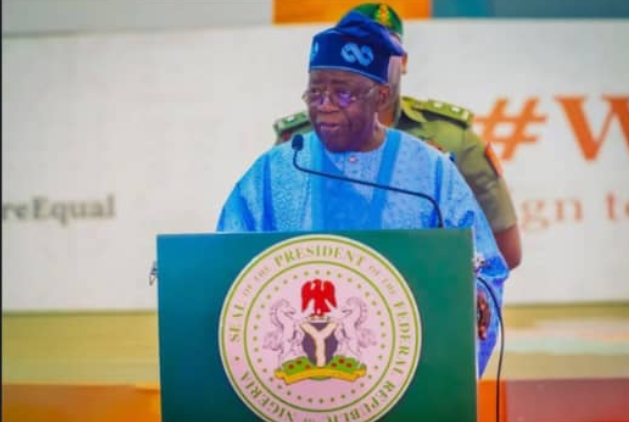In a bold and symbolic gesture of leadership, President Bola Ahmed Tinubu on Wednesday, June 18, defied heavy rains, flooded roads, and bad weather to visit Benue State—an area recently ravaged by violence and human suffering. Arriving in the state capital, Makurdi, at precisely 12:58 pm, the President’s unannounced visit comes amid widespread public outcry over the increasing wave of attacks attributed to suspected armed herdsmen.
Over the past few days, Benue State has once again found itself in the eye of a humanitarian storm. Several villages in Guma, Logo, and Agatu local government areas have been reportedly attacked by gunmen. In what many now describe as a massacre, more than 200 people have been killed, with many others left injured and thousands displaced from their ancestral homes. These brutal assaults have reignited long-standing ethnic and land-use tensions in a region that has historically been a hotspot for farmer-herder conflicts.
Adding to the tragedy, heavy rainfall and flooding have compounded the suffering of already vulnerable communities. Access to relief centers has been limited, roadways are submerged, and farms destroyed—deepening the region’s food insecurity and economic instability.
President Tinubu’s visit, though brief, sends a significant message. His choice to press forward despite dangerous travel conditions signals a shift in tone and urgency from the presidency. Dressed in traditional attire and standing before the seal of the Federal Republic, Tinubu addressed community leaders, victims, and displaced persons with a solemn vow:
“We will not allow this suffering to continue unchecked.”
This marks Tinubu’s first major visit to the state since taking office, and it comes at a time when residents and advocacy groups have been demanding stronger federal intervention. Calls for military reinforcement, aid distribution, and justice for the victims have grown louder, especially on social media where photos and videos of the destruction have gone viral.
While reactions to Tinubu’s visit are mixed—some applauding the president’s courage and empathy, others questioning the timing—it is undeniably a moment that has drawn national and international attention to Benue’s plight.
What remains to be seen is whether this visit will translate into sustained action: stronger security presence, accelerated relief efforts, and concrete policies to prevent further bloodshed. For now, however, the people of Benue have seen the President stand on their soil—rain-soaked, grieving, but not forgotten.
President Bola Tinubu’s unscheduled visit to Benue State on Wednesday, June 18, was more than a photo-op—it was a raw, urgent address in the epicenter of tragedy. Standing before devastated communities amid rain-soaked roads, he delivered a speech that blended grief, disgust, and a call to arms:
“We have come to mourn with you, to stand with you. Nothing—not floods, not bad weather—should halt the federal government’s compassion and determination. Over 200 innocent souls—women, children, whole families—were brutally cut down in Yelewata. This is shameful. This is unacceptable. I have directed the security agencies to act decisively and arrest perpetrators of these evil acts on all sides of the conflict and prosecute them”
The President paused before delivering his harshest warning:
“Value of human life is far greater than that of a cow. The lives lost in Benue… must not fade into obscurity or become another statistic. I have asked for immediate deployment of federal forces and special medical support. I have asked for blood donation drives and emergency relief. And I will follow through—personally”
He pressed on to challenge complacency:
“I query why no arrests yet. How long will we tolerate killer herdsmen roaming freely? My government will not tolerate this cycle of violence. We are reviewing every intelligence and every strategy. Justice will not wait.”
Why This Speech Matters Now
In just a few hours, Tinubu’s words laid bare the scale of horror: over 200 killed, whole villages turned to rubble, and survivors left stranded—facing both human violence and raging floods. This speech signals a departure from distance to accountability: security agencies have been given direct orders, aid has been mobilized, and high stakes have been put squarely on the President’s agenda.
Can Words Match the Moment?
The President’s condemnation is unequivocal—but the people of Benue bear scars deeper than slogans. They need action. Military support, arrests, prosecutions, humanitarian aid, and rebuilding plans must follow. The Senate, traditional rulers, and media are all promising “enough is enough.” Yet amidst rising international pressure and viral outrage, the question remains: Will Tinubu’s fiery rhetoric turn into lasting change—or will Benue fade from the headlines?

As journalists flood into Makurdi and relief convoys head out to Guma, Logo, and Agatu LGAs, Tinubu’s speech will be judged not by its emotion—but by its outcomes. For Benue, a shattered region with over 200 lives lost, that hope cannot come soon enough.
Source: Politics Nigeria

